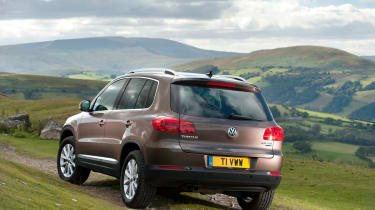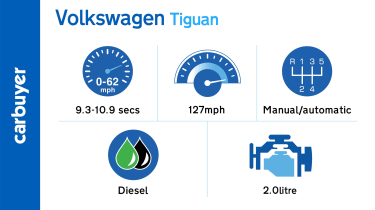Volkswagen Tiguan SUV (2007-2016) - Engines, drive & performance
For its price, power and economy, the two-wheel-drive Volkswagen Tiguan 2.0-litre TDI 140 is the best-balanced model in the range
The Volkswagen Tiguan's diesel-only engine range offers a broad spread of power outputs and fuel economy. Although it has a tall body, the Tiguan resists body lean well in corners. Its suspension is a little firm, but this makes it one of the better SUVs to drive. The standard electronic parking brake may not be to everyone’s taste, especially if you’re the sort of driver who likes the fine control a handbrake provides.
The Tiguan is fun to drive, with minimal body lean in corners and plenty of steering feel. The four-wheel-drive system is designed to improve on-road grip rather than provide serious off-road traction. For this reason, and since two-wheel-drive versions are already very grippy, we don’t think it’s worth the extra expense.
Volkswagen Tiguan diesel engines
Thanks to their extra pulling power and superior fuel economy, the quiet and refined diesel-powered Tiguans have always been a better buy than the petrol models. The basic 2.0-litre TDI 110 is a little slow, however, with 0-62mph taking 11.9 seconds. The more powerful 2.0-litre TDI 150 does the same sprint in 9.8 seconds. The optional four-wheel-drive system provides added security with only a slight drop-off in acceleration. For its price, power and fuel economy, the two-wheel-drive 2.0-litre TDI 150 is in our opinion the best-balanced model in the Tiguan range.
The 2.0-litre TDI 184 was dropped towards the end of the Tiguan's life, but it was the most powerful diesel option. It was available only with four-wheel drive and did 0-62mph in 8.3 seconds, just slightly faster than the four-wheel-drive Mazda CX-5 2.2-litre 175 diesel, which manages it in 8.8 seconds. However, that car is more economical, returning 54.3mpg compared to the Tiguan's 49.6mpg, plus it’s also cheaper to tax.













